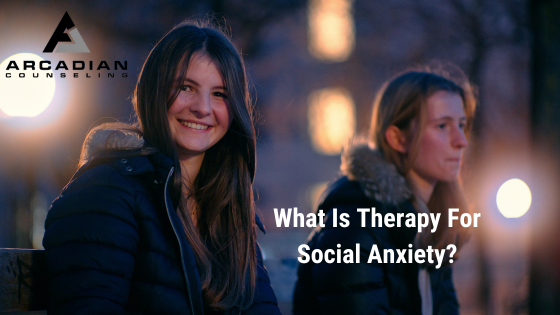Social anxiety, aka social phobia, is the third most common mental health condition characterized by an intense and persistent fear of social situations and interactions. People with social anxiety often experience excessive worry about being judged, embarrassed, or negatively evaluated by others. Fortunately, therapy is a highly effective treatment for social anxiety.
Understanding Social Anxiety

Social anxiety goes beyond ordinary shyness; it can significantly disrupt a person’s life, affecting their relationships, work, and overall well-being.
The most common symptoms of social anxiety are:
- Intense fear of social situations, such as parties, meetings, or public speaking.
- Avoidance of social gatherings or situations.
- Physical symptoms like sweating, trembling, blushing, or a racing heart when facing social interactions.
- Negative self-perception and self-criticism.
- Worrying excessively before and after social events.
What Is Therapy for Social Anxiety?
Therapy for social anxiety offers a supportive and structured environment where individuals can explore and address the challenges they face in social situations. Through therapy, individuals can learn effective coping strategies, gain a deeper understanding of their anxiety triggers, and develop self-confidence. It provides a safe space to work through the thoughts and emotions that often accompany social anxiety, leading to improved interpersonal skills and a greater sense of well-being. Therapy can be a valuable tool for those seeking to break free from the constraints of social anxiety and build more fulfilling social connections.
Sadly social anxiety often goes untreated. Many people with social anxiety don’t recognize their symptoms as a treatable. Instead, they may simply attribute their discomfort to shyness or personality traits. Additionally, the avoidance behaviors common in social anxiety can reinforce the idea that avoiding social situations is the only solution, making it less likely for individuals to seek therapy for social anxiety.
Common Therapeutic Approaches for Social Anxiety

Several evidence-based therapeutic approaches are effective in treating social anxiety disorder:
- Cognitive-Behavioral Therapy (CBT): Cognitive Behavioral Therapy is an effective therapeutic approach for individuals struggling with social anxiety by addressing the cognitive and behavioral patterns contributing to their distress. Through CBT, individuals learn to identify and challenge negative thought patterns, such as irrational fears of judgment or embarrassment in social situations, and replace them with more realistic and balanced thoughts. Additionally, CBT helps individuals develop coping strategies and social skills to gradually confront and tolerate anxiety-provoking situations.
- Exposure Therapy: Exposure therapy involves gradually facing feared social situations in a controlled and systematic way. Over time, individuals become desensitized to their anxieties and develop greater confidence in handling social interactions.
- Group Therapy: Group therapy sessions provide a supportive environment where individuals can practice social skills and receive feedback from peers. This can be particularly helpful for those who fear judgment or evaluation.
- Medication: In some cases, medication, such as selective serotonin reuptake inhibitors (SSRIs) or anti-anxiety medications, may be prescribed to manage symptoms. Medication is often (and should be) used in conjunction with therapy.
- Mindfulness-Based Approaches: Techniques like mindfulness meditation and acceptance and commitment therapy (ACT) can help individuals manage social anxiety by focusing on the present moment and accepting their feelings without judgment, defusing from unhelpful thought patterns, cultivating mindfulness, clarifying their core values, and committing to taking meaningful actions aligned with those values
Life is short, but living with social anxiety will make it feel like an eternity (and not in a good way ????). Find a well-trained therapist you like and trust who utilizes evidence-based approaches like ACT, exposure therapy, or group therapy, so you can gain the tools and confidence needed to face social situations with greater ease so you can start thriving!
James Killian, LPC is the Principal Therapist & Owner of Arcadian Counseling in Greater New Haven, CT where they specialize in helping over-thinkers, high achievers, and perfectionists reduce stress, increase fulfillment and enhance performance so they can move From Surviving To Thriving.

